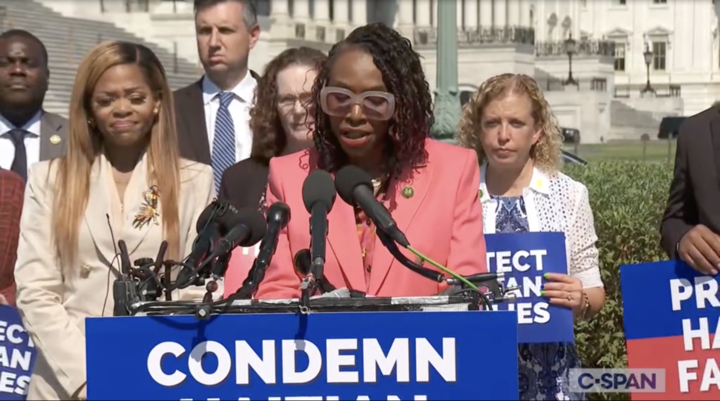WASHINGTON — With only 21 days until the U.S. elections, the topic of immigration remains high on voters’ minds due to bipartisan calls for stricter border policies and politicians’ rhetoric against Haitian immigrants in Springfield, Ohio. Republican presidential candidate Donald Trump and running mate JD Vance’s questioning of Haitian immigrants’ legality under Temporary Protected Status has politicized the protection and stirred fear in Haitian communities across the country.
Rep. Yvette Clarke, a New York Democrat who co-founded and co-chairs the House Haiti Caucus, spoke to the Medill News Service about the value Temporary Protected Status brings to her district and the negative impacts of anti-Haitian speech.
Rep. Clarke has served Brooklyn communities in Congress since 2007. She co-chairs the Congressional Caribbean Caucus and is the Immigration Task Force leader for the Congressional Black Caucus. New York follows Florida as the state with the highest concentration of Haitian immigrants in the country, according to a 2023 report from the Migration Policy Institute.
The Caucus first spoke on the fallout from Springfield in a Sept. 20 press conference, where its members introduced legislation to condemn the racism against Haitians and Haitian Americans.
As politicians veer away from providing humanitarian protections for migrants, Rep. Clarke said the House Haiti Caucus plans to continue advocating for TPS protections for Haitians across the country.
The Q&A below has been edited for brevity and clarity.
Medill News Service: Could you tell me more about your work as co-chair and co-founder of the House Haiti Caucus, including how temporary protected status plays a role?
Clarke: We’ve always monitored what was happening in Haiti as part of the work that we do advocating for TPS and for comprehensive immigration reform. Then when the governance of Haiti became a huge international issue, we continued to drill down to help folks in civil society get support from the federal government, and it has been a downward spiral ever since. With the election of Rep. Sheila Cherfilus-McCormick (D-FL), we had someone coming out of Florida who is Haitian American for the first time in Congress. We then were able to add to the Caucus the perspective of those who are actually from Haiti.
Medill News Service: How have you seen TPS benefit the Haitian community in your district in New York?
Clarke: Given the crises that the Haitian people have endured, we see TPS as a lifeline for those who made it to our shores and are capable of contributing to our society while seeing the United States as a way-station until stability is brought back to their home of origin. TPS enables a work permit, which is a godsend for many of these families, not only to meet their needs here in the United States, but in many cases, remittances that are sent back to families that are struggling in Haiti.
Medill News Service: What is your opinion of the nation’s recent debate over these TPS holders’ legality, especially with the claims that JD Vance and Donald Trump are making?
Clarke: It’s silly season. It’s playing politics with people’s lives, a humanitarian crisis that no one has ever witnessed before. TPS has been a tool utilized in the United States since the 1990s. This is a legal method of extending humanitarian efforts on behalf of the United States. Unfortunately, JD Vance has decided to basically weaponize it to mean something totally different and to undercut its well-meaning intention.
Medill News Service: Are there any next steps you plan to take to address the need for TPS and to address these claims?
Clarke: We’re going to continue to appeal to the Biden administration to make sure that TPS is extended. There are many who are here currently under TPS. The end of that status puts them in legal jeopardy of being deported. It cuts off a means by which they’re adding value to our society by being able to work, including in various fields that are seeing shortages right now.
Medill News Service: Have you spoken to any Haitian members of your district about how they’re feeling in light of all of this going on?
Clarke: We’ve had non-stop conversations with the people in my district. We have a big history of generations of Haitian Americans coming to the United States and making Brooklyn, New York their home. With all of the local elected officials of Haitian descent, along with all of the nonprofit organizations that continue to raise money for Haiti relief that support NGOs on the ground in Haiti, we hear from them frequently.
Medill News Service: How are they responding to this event at the moment?
Clarke: It’s distressing. Anyone who is conscious of the challenge that Haiti is facing right now understands that this is a moment where America can shine, where we can demonstrate what we’ve always lived up to a creed to accept those who are fleeing persecution and violence and hunger. Our job is to make sure that our nation lives up to it.

